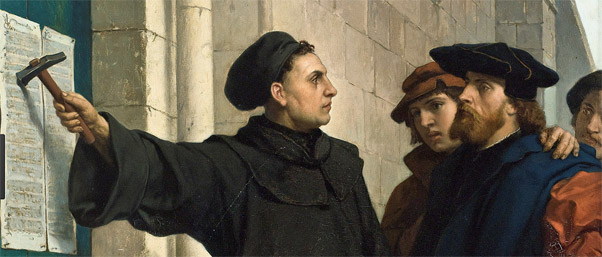
It was 500 years ago that a monk, pastor and theologian names Martin Luther posted his 95 Theses for debate on the Wittenburg Door ay his university. His intent was purifying and reforming the abuses connected with indulgences. The unforeseen consequences? The division of Western Christianity into Protestant vs. Roman Catholic – and the Protestant themselves continuing their divisions.
There were actually five reformations during the next 50 years after Brother Martin’s posting. The first was the Lutheran one that spread throughout parts of Germany and Scandinavia and influenced Christian traditions everywhere. Luther’s great cry that salvation was sola fide (faith alone) united all Protestants, even as his views on the sacraments and church structure were not always popular.
The second reformation originated in Zurich, under the leadership of priest and humanist scholar Zwingli. He agreed with Luther on grace, but his zeal led to different views on communion, church order and certain theological emphases.
The second Reformed stream in Switzerland was in Geneva, led by John Calvin, the most influential theologian in Protestant history. Calvin was a scholar and his Geneva became the missionary training center for Reformed leaders throughout Europe and the New World.
The third stream was the Anglican tradition. Beginning with King Henry VIII in 1532-34 and stabilized by Elizabeth I in 1559, the Church of England represented a via media between Protestant and Roman Catholic structures and theologies. The Anglican church itself would be torn by conflict for over a century and a half between High Church traditionalists and Puritan reformers and (later) Methodist enthusiasts.
The Anabaptist communities represent the most radical reformers of all. Unlike their Magisterial counterparts (who advocated one religion for each nation), Anabaptist believed that church membership was voluntary and the ecclesial and secular powers must remain separate. They also affirmed that baptism was reserved for those who has a personal experience of conversion; therefore, no infant baptism. They were also pacifists, declaring the incompatibility of true Christianity and the exercise of military power. They were unpopular among all the other traditions, with over 100,000 martyrs in the 16th century.
The final reforming impulse is found in the Roman Catholic church. At the on-again, off-again Council of Trent (1545-1564), the worst moral and political abuses were addressed and traditional doctrines and disciplines reaffirmed. The new Jesuit order led the charge for reform under the inspired leadership of Ignatius of Loyola.
As we reflect on this moment, both lament and celebration are in order. Sober thinking leaders of all traditions acknowledge some of the zealous excesses of all traditions and even Roman Catholic leader affirm that is would have been wise to listen to Luther and not merely resist his ideas. The good news is that out of both the affirmations of faith and the ashes of conflict, many of the key ideas underpinning Western Civilization are strengthened, from the importance of the individual, freedom of conscience (after the exhaustion of more than a century of war), the rule of la (Lex Rex) and the goodness of all work, bother clerical and lay occupations.
